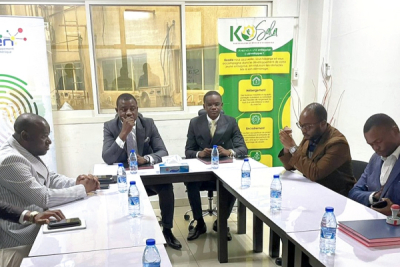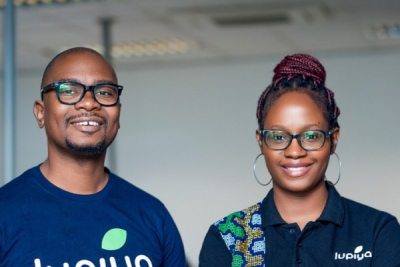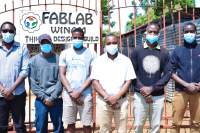By allowing farmers access to technologies and adequate markets, he helps solve some of the key challenges facing Africa. Some of those challenges include food security, poverty, and unemployment.
Karidas Tshintsholo (photo) is the founder and CEO of Khula, a South African startup that provides a marketplace and software for farmers to grow their businesses.
The tech entrepreneur attended Ekangala Comprehensive High School from 2008 to 2012. He then studied business at the University of Cape Town from 2013 to 2015. Soon after that, in 2017, he founded Khula with Matthew Piper and Jackson Dyora.
His startup aims to provide a support ecosystem connecting farmers with buyers, technical services, financing, and inputs across Africa.
Khula’s digital platform is not only a fresh produce marketplace where farmers can list their products and buyers can place orders. It also serves as an input marketplace where growers can buy seeds, fertilizers, pesticides... from verified suppliers. Khula is also a traders' platform, where traders can source products from farmers and sell them to buyers. It offers a dashboard, where farmers can access financing options from a variety of lenders.
With over 100 suppliers, more than 130 warehouses, and more than 190 agricultural advisors in South Africa, it offers more than 3,000 products from local and international suppliers and can deliver to every province and major agricultural region in its origin country. Karidas Tshintsholo, the CEO who oversees its operations, is a member of the Southern Africa Council of the International Fresh Produce Association, an association representing companies in the global fresh produce and floral supply chain.
In 2013, the tech entrepreneur co-founded MoneyTree Group, a media, publishing, and marketing company focused on youth and emerging markets/segments of the economy. Till 2017, he served as the executive director of that company. From 2014 to 2015, he was the executive project manager of Investor Games, a gamified investing training platform created by Investment Society (InvestSoc.), the South African NGO that provides “holistic, business-focused practical education at every major tertiary institution in South Africa.”
Karidas Tshintsholo has received awards throughout his entrepreneurial journey. In 2015, he became a fellow of the Anzisha Prize, a fellowship of which he has been a member of the advisory board since 2021. In 2019, he was named among the Forbes Africa 30 Under 30.
Melchior Koba
Sattelite internet provider Starlink has applied for a license to operate in Zimbabwe, Information Minister Jenfan Muswere confirmed on Monday, September 18. According to the official, the application is currently being reviewed by the Postal and Telecommunications Regulatory Authority.
Tourism is a key economic sector in Namibia. At a time when the government is struggling to showcase the country’s attractions, digital solutions could contribute to the effective implementation of ongoing projects.
LEFA Transportation Services, a Namibian e-mobility solution that connects drivers and passengers via its digital platform, announced on Monday, September 18 a partnership with Google Maps, the global online mapping service developed by Google.
The partnership aims to showcase Namibia's vast expanses on Google Street View, a virtual navigation service that complements Google Maps and Google Earth by enabling 360° panorama views.
"By making the nation’s natural wonders, historic sites, and urban landscapes accessible with the click of a button, potential tourists can be enticed to experience the beauty of Namibia first-hand," said Melkies Ausiku, founder and general manager of LEFA Transportation Services.
As part of this ambitious 17,000 km project, Google Maps will carry out a major update on Namibia. Eventually, locals and visitors alike will discover greater precision in the names of the streets and newly mapped roads.
According to Melkies Ausiku, the project will provide an authentic and comprehensive digital representation of Namibia. The digital representation will thus serve as an innovative marketing tool, opening up opportunities for businesses to attract a global customer base. Local businesses, from charming accommodations to restaurants, cultural sites, and tour operators, will benefit from unrivaled visibility.
Samira Njoya
Kosala PME offers a range of services and programs designed to inspire and support budding and existing entrepreneurs in the Congo. The incubator and accelerator has already supported a multitude of projects and start-ups.
Kosala is a platform that aims to provide tailored support and financing to facilitate the creation and development of new businesses in the Republic of Congo. Founded in 2019 by Trésor Dexter Omono, a young Congolese entrepreneur and innovator, Kosala offers a range of services and programs to help entrepreneurs achieve their goals and dreams.
It offers incubation and acceleration programs for startups and small and medium-sized enterprises (SMEs). Through these services, it offers entrepreneurs coaching, mentoring, training, networking, and financing opportunities. It also organizes events and workshops to promote the culture of entrepreneurship and innovation in the country.
Kosala also offers co-working spaces. Through the Kosala Académie, the incubator helps its students acquire skills in various fields, including digital, management, and entrepreneurship. It enables entrepreneurs to domicile their startup at its address and to obtain tailor-made assistance with the administrative formalities involved in setting up a business.
The incubator also builds partnerships with various public and private institutions to support the digital ecosystem in Congo. For example, in July 2023 it signed a partnership agreement with the Agence de développement de l'économie numérique (ADEN CG) to promote digital inclusion, skills development, and job creation.
On its website, Kosala indicates that it currently supports 3,750 projects and has an 85% success rate.
Melchior Koba
Zambian fintech Lupiya announced on Tuesday, September 19 the successful completion of an $8.25 million Series A funding round. Evelyn Chilomo Kaingu (photo, right), co-founder of the fintech, explains that with the support of Alitheia IDF, INOKS Capital, Mastercard, and Kfw DEG, Lupiya is “poised to provide holistic financial services not only to its Zambian customers but also to expand its reach across East and Southern Africa.”
Armelle Touko is a publisher who believes in the power of books to shape the minds and hearts of African children. With her daughter, she set up the digital publishing platform Adinkra Jeunesse, which offers African content to African children.
Armelle Touko (photo) is a Cameroonian-born author and publisher. She is the founder and managing partner of Adinkra Jeunesse, a digital platform offering unlimited access to African children's books. She aims to inspire and educate young readers with stories that reflect their culture.
The young publisher is a graduate of ESSTIC (Higher School of Information and Communication Sciences and Techniques (ESSTIC), where she obtained a master's degree in communications in 2007. She also holds a master's degree in marketing from ESSEC (Advanced School of Economics and Business), in 2014.
In 2018, she founded Adinkra Jeunesse with her then 10-year-old daughter Marie Gabrielle. The platform offers illustrated books, audio stories, games, coloring sheets, educational sheets, and parenting sheets in French, English, and local languages, for children aged 3 to 12.
Since 2021, Armelle Touko has been organizing writing workshops, through her 100 Petits Ecrivains program. The program aims to encourage children aged 6 to 14 to create stories on their own.
Armelle Touko is also the founder of Adinkra Femme, a collective of authors who write on subjects such as violence and women's empowerment.
She has professional experience in publishing, organizational communication, and behavior change communication. That professional career began in 2008 at Yaounde as an Editorial Manager. In 2010, she joined Alpha Assurances as Communications and Public Works Manager.
For more than five years, from 2015 to 2020, she worked as communications and social mobilization coordinator for the program for access to reproductive health services (PASSR) implemented in the Far North and East regions of Cameroon.
Armelle Touko's work has been celebrated by several awards, including the Label Innovation IFC 2022, which celebrates, supports, and promotes startups in the cultural and creative industries sector. She is also the winner of the 2023 edition of POESAM, which rewards innovative projects in education and social action in Africa.
Melchior Koba
In Africa, governments are gradually adopting tech solutions to address document fraud, identity theft, terrorism, and cybercrime as well as upgrade to international standards.
The Federal Republic of Somalia will start issuing biometric identity cards to its citizens. On Sunday, September 17, on the sidelines of a conference organized in Mogadishu by the National Identification and Registration Authority (NIRA), Prime Minister Hamza Abdi Barre inaugurated the Somali National Identification System (SNIDS).
Designed with the help of a multi-million dollar grant from Pakistan, the new system aims to provide Somalis with a secure and universally recognized form of identification.
The SNIDS digital solution was developed by NIRA in partnership with NADRA, Pakistan's National Database and Registration Authority. It is the result of a partnership signed by the two institutions in 2017. It aims to issue identity cards to at least 15 million Somalis, including children, by 2026. It is in line with "ID4Africa", a movement that aims to provide all Africans with a digital identity by 2030.
The system will assign a unique identification number (NIU) based on demographic and biometric data to any individual of Somali nationality or resident in Somalia. According to the Prime Minister, this identity number will serve as an identification document for each individual until his or her death. This data, together with the NIU, will make it possible to set up a central, secure, and reliable database that will serve as a reference for verifying the identity of beneficiaries of public, private, or social services.
"NADRA takes immense pride in the successful execution and launch of Somalia's National Identification System. This achievement reinforces Pakistan’s vision for a more secure and prosperous Somalia, where every citizen has access to reliable identification. The National ID System will not only bolster security but also pave the way for inclusive development, financial empowerment, and improved governance," said NADRA Chairman Asad Rehman Gilani.
Samira Njoya
With the acceleration of digital transformation across Africa, private and public companies and public administration are looking for digital skills. This startup offers a solution with its edtech platform.
Stutern is an edtech platform developed by a Nigerian startup. It enables access to IT courses online. Based in Lagos, the startup behind the edtech platform was founded in 2015 by Kehinde Ayanleye (photo, right) and Taiwo Ayanleye (photo, left).
On Stutern, users can choose from a range of courses, including UI/UX design, front-end and back-end web development, data science, and mobile development. As the solution has no mobile app, users have to visit its web platform, create their accounts, and register their interest in the said courses.
To register their interest, they need to fill out a form stating their interest and motivation and answer questions about their general skills in writing and video form. They will then answer specific and technical questions relating to the chosen program. Their suitability to the desired courses will be determined based on the various answers provided.
Training lasts between 16 and 24 weeks, with two sessions per week. It's worth noting that courses are held live online, and learners can ask questions for better understanding. The edtech startup allows learners to pay their fees in three different ways. These include full payment, payment in installments, and a revenue-sharing agreement. The latter means that the learner pays part of the tuition during the course and then repays the rest after finding a job, according to a revenue-sharing agreement.
Adoni Conrad Quenum
In Kenya, Fablab Winam promotes manufacturing, research, and education. It offers designers, artists, scientists, engineers, and students an open-access laboratory to stimulate their creativity.
Fablab Winam is a material innovation and digital fabrication makerspace created in Kenya to enable people with creative ideas to come together to share solutions and tools for prototyping and startup incubation.
The lab was founded in 2018 by Martin Oloo, a former Fab Academy graduate. The founder is also the lab's managing director, overseeing its operations and partnerships. His vision is to create a culture of manufacturing, collaboration, and creativity, among other things, in the country.
Fablab Winam offers a range of services, including training in 2D and 3D printing, laser cutting, vinyl cutting, circuit production, fabrication, prototyping, mentoring, and consulting. It also organizes various programs to educate and inspire different groups of people.
The first is the STEAM (Science, Technology, Engineering, Arts and Mathematics) Fab Kids program designed for children and early high school students. It offers virtual courses in Scratch programming, Arduino circuits and programming, web development (WordPress), and 2D and 3D modeling.
The next is the Fab Design Academy, which aims to improve the design skills of local manufacturers and producers to produce competitive items for the market. There's also the Jua Kali Plus project, which supports Jua Kali artisans (workers in the informal sector) to improve the quality of their products and produce spare parts locally.
Fablab Winam also organizes Fab Internships, a program that builds students' practical skills before sending them on internships with local companies. It is also the first Kenyan fablab outside Nairobi to host the Fab Academy, an online course on digital fabrication.
Fablab Winam also hosts monthly events such as International Youth Day, which teaches topics such as energy efficiency, sustainable agriculture, the circular economy, green building and design, water management, and much more.
In 2022, the fablab helped over 300 people and completed more than 100 projects. The lab has also received recognition and support from various organizations, such as AfriLabs, ICT Authority, Liquid Telecom, Africa Open Science Hardware, and Shuttleworth Foundation, among others.
Melchior Koba
After convincing ByteDance, TikTok's parent company, to open a regional office in Kenya, President William Ruto wants to convince other global tech giants to do the same.
On Friday, September 15, William Ruto (photo, left) met with the heads of several American multinational technology companies in San Francisco. The aim is to convince these firms to invest in Africa, particularly in his country, Kenya.
"Kenya is your gateway to the Silicon Savannah [Kenya's technology ecosystem created as a local version of the U.S. Silicon Valley], to the East African Community, the most integrated regional market of 500 million, and a Pan-African market of 1.4 billion. If you build it in Kenya, it works for Africa, and if you set it up in Kenya, your African footprint is guaranteed," the Kenyan president said.
Kenya, Egypt, South Africa, and Nigeria are the countries attracting the most investment in Africa's technology sector. On a continental scale, Kenya is a mature ecosystem, and the executive is doing what's necessary to attract more capital and investors. In August 2023, after a virtual meeting with President Ruto, Chinese giant Bytedance’s executives decided to open offices in the country.
“Kenya is a full package investment destination; economically stable, entrepreneurial, secure, innovative with a favorable tax environment, skilled labor force, technological expertise, green energy credentials and a gateway for six undersea fiber-optic cables providing reliable data connectivity,” the president told investors in Silicon Valley.
Several executives and/or representatives of the technology firms present at the meeting were won over by the President's speech. Apple Chairman and CEO Tim Cook is reportedly considering the creation of a developer academy and also plans to exploit the potential of the country's green data centers. Google wants to invest several million dollars to strengthen its digital training and innovation initiatives on the continent. As for Visa, the fintech company has already chosen Kenya as the location for its global digital innovation studio.
Adoni Conrad Quenum
More...
Experienced in the banking and financial services sectors, he developed a passion for the blockchain and cryptocurrency industry. This led to the creation of Wakanda 4.0, a digital transformation company, in 2020.
Benito Elisa (photo) is the founder and CEO of Wakanda 4.0, a digital transformation company offering consulting, software development, training, business development, conference organization, graphic design, and video creation. He is also a seasoned professional with extensive experience in the banking and financial sectors.
The Mauritian-born entrepreneur holds a Bachelor's degree in Banking Law and International Finance, obtained in 2010 from the Mauritius University of Technology. He is also a graduate of the University of Mauritius, where he obtained a master's degree in marketing operations for personal and financial business services in 2013.
In 2020, when he launched Wakanda 4.0 Ltd, his vision was to become the most trusted digital partner to the Web 3.0 industry in the African and Middle Eastern regions. He also wanted to promote innovation and education on the African continent, where he believes there is enormous potential for growth and development.
Vice-Chairman of the Africa Emerging Tech Hub, Benito Elisa is also the founder and CEO of Fluffy Goodies, an e-commerce platform for personalized treats. He is also the official representative of Gulf Xellence, an event management and professional training company, in Mauritius.
A lecturer on fintech innovations at the Mauritius University of Technology, he is also an advisor to Nurika, a Nigerian AI-powered platform dedicated to promoting healthy lifestyles as well as encouraging the adoption of blockchain and cryptocurrencies.
Between 2010 and 2015, he worked as Bramer Bank's private banking relationship manager, and in the following two years, he was the financial services advisor to the Mauritian Ministry of Financial Services and Good Governance.
An alumnus of the La Plage Factory incubator, Benito Elisa is a winner of the 2022 edition of Africa's Most Respected CEO Awards for digital solutions in the blockchain and virtual assets industry.
Melchior Koba
Over the past few years, digital adoption and digitization have grown steadily across Africa. Well aware of the importance of that digital sector for the development of several sectors, Morocco is stepping up efforts to fully capitalize on the opportunities offered.
On Friday, September 15 in Rabat, the Moroccan Ministry of Digital Transition and Administrative Reform (MTNRA) and the German International Development Cooperation Agency (GIZ) signed two partnership agreements. The agreements aim to promote digital transformation of the public administration and the digital inclusion of very small and medium-sized enterprises (VSEs) and small and medium-sized enterprises (SMEs) in Morocco.
The first agreement, worth 3 million euros, will run for 3 years. It aims to support public agencies and institutions in their efforts to modernize services offered to citizens.
The second partnership, valued at 5 million euros, is dedicated to enhancing the technical and organizational capabilities of institutional stakeholders committed to promoting digital inclusion among SMEs. This initiative will oversee the development of mechanisms designed to lower transaction costs for service providers, ensuring the seamless digitization of SMEs and bolstering their capacity to leverage tailored services for their digital transformation. This agreement will be in effect for 4 years.
The new agreements complement several others recently signed with major national and international tech companies to promote the digital sector in Morocco. They are in line with Maroc Digital 2020– Now Maroc Digital 2025– that sets digital transformation of the public administration as one of its key focuses.
According to Ghita Mezzour (photo, center), the Minister Delegate in charge of Digital Transition and Administrative Reform, modernizing the administration is one of the Ministry's biggest projects, as it strives to increase efficiency and performance, and make administrative procedures and processes more transparent and accessible, in line with directives of the King of Morrocco.
For years now, drones have proven their worth in many fields. By providing aerial views of a given area, they give the ability to capture data that was previously inaccessible, making their use more important than ever.
Last Friday, the Rwanda Investigation Bureau (RIB) and the Ministry of the Environment jointly launched the use of drones to combat environmental crimes in the country.
The first drone, dubbed "Inganji I", will monitor, detect, and collect evidence that will be used to prosecute those engaged in activities that degrade the environment.
"The drones will help to respond to and control activities that damage our environment including land degradation, water pollution, and illegal logging in protected areas," said Environment Minister Jeanne d'Arc Mujawamariya (photo, center). According to the government official, who cited a recent report, illegal mining, community encroachment into protected areas and water pollution are the most environmentally degrading activities in the country.
The launch of this first drone is part of a long-term green growth and climate resilience strategy and an ambitious climate action plan set up a few years ago by the Rwandan government. The aim is to reduce carbon emissions by 38% by 2030 and achieve carbon neutrality by 2050.
The use of drones will thus play a crucial role in achieving these objectives. Among other things, it will help environmental inspectors carry out their tasks, collect information in prohibited areas, and provide accurate data.
Samira Njoya
On Friday, September 15, Edasso Rodrigue Bayala (photo), Burkina Faso’s Justice Minister, launched “e-casier judiciaire”, a web platform for the retrieval of criminal record certificates. The pilot jurisdictions on the web platform are the courts of Ouaga I and II. Later, the service will be extended nationwide.















